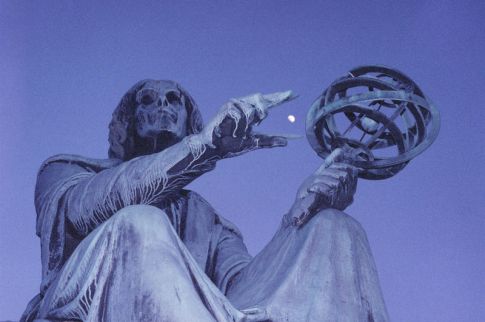In keeping with the subject of Earth-shaking historical impacts -- the last resting place of Copernicus has now been positively identified.
From Science News:
"Polish archaeologist Jerzy Gassowski told a news conference that forensic facial reconstruction of the skull, missing the lower jaw, his team found in 2005 buried in a Roman Catholic Cathedral in Frombork, Poland, bears striking resemblance to existing portraits of Copernicus."
. . . including the scar on his temple, a suggestive detail. The skull in itself wouldn't settle the issue, of course, but the next step in analysis is a fascinating one:
". . . in the next stage, Swedish genetics expert Marie Allen analyzed DNA from a vertebrae, a tooth and femur bone and matched and compared it to that taken from two hairs retrieved from a book that the 16th-century Polish astronomer owned, which is kept at a library of Sweden's Uppsala University where Allen works. 'We collected four hairs and two of them are from the same individual as the bones,' Allen said."
That all but clinches it; this is indeed the Great Man's mortal coil. Unless, of course, the person whose skull was buried in Frombork happened to lean over the book Copernicus was reading and two of his hairs fell onto the page. (Stranger things have happened. Those who believe Shakespeare's plays were written by the glover's son from Stratford with the semi-legible scrawl still have to explain why Edward de Vere's bible has critical words from the plays underlined in it. Unless - my radical idea for this month -- Shakespeare borrowed de Vere's book. But that's a discussion for another blog.)
Copernicus, as we all know, quietly circulated his burgeoning heliocentric cosmology among the cognoscenti but delayed a general publication until just before his death - partly out of concern that said death not be hastened along a bit by the church to which he belonged. If it was a charge of heresy the astronomer cleric feared, he was right to do so: the book, De Revolutionibus Orbium Caelestium, was eventually placed on the Index of Prohibited Books, there to remain until the middle of the 19th century. Even before it was banned, a deflating forward was added by Osiander to De Revolutionibus, saying it was, after all, only a mathematical nicety (today Osiander would call it "just a theory") and certainly not the truth. During the counter-reformation, the Church looked ever more thinly on dissenting cosmological ideas, though it was the Protestant countries that first took up the banner against Copernicus. Both Luther and Calvin decried him in low terms, and it fell to men like Galileo, himself threatened with torture by Rome, to turn the Copernican insight into the shape of modernity.
But it started with the polymath from Poland. Without Copernicus, none of what we do at FQXi would exist, and along with it would fade the great majority of our contemporary world. His willingness to speculate freely (even, in the context of his day, "absurdly") on a fringe idea; to ground his speculations on cautious data; to work them out in mathematical detail; these powerful strokes created the Scientific Revolution out of which our era of interplanetary probes and quantum chips was born. Titans such as Copernicus and Galileo did more foundational work - and took greater personal risk for it - than any of us are likely to again.
And yet the possibility is always there. Nature is, quite probably, infinite in its complexity, and another Copernican revolution is always waiting. What would it mean for humanity, for example, if we were to discover that the entire observable universe is in fact inside a black hole? That history can be reversed, or that time does not, in a deep sense, exist? That the cosmos is both eternal and self-creating? That there is another version of me writing these words, just now undergoing quantum decoherence and headed off to live his own, separate life?
Would such discoveries run afoul of the religious establishments of our day? The social and societal norms, the political norms? What would we be willing to risk in terms of being thought crazy, or blasphemous, or "not a real scientist," in order to discover that we are all Boltzmann brains, emerged randomly from a sea of chaotic data points? Or that the mathematics we choose to employ determines the objective structure of the phenomena it describes? What I admire most about Copernicus is not his daring in finally printing De Revolutionibus, but his daring in *thinking* it. How difficult it must have been to set aside virtually the whole cosmology with which his world was familiar and try something truly new.
We have technology now of which the Renaissance could not have conceived. Have we the courage of Copernicus to shake the very Earth?
